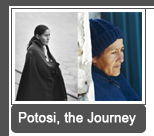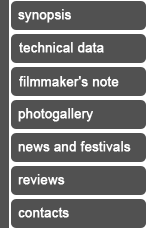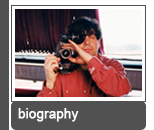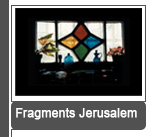
 |
 |
 |
 |
Director’s statement, July 2007
There is a time in life when we decide to leave the environment we live in and to make a journey. This journey may reveal itself highly significant to us. We may discover years later that it changed our perception of the world, and the course of our life. It happened to me when I was 20 … and again when approaching 50.
Potosi was the focus of those two journeys. Though most of the people outside Bolivia have never heard of that city, I believe it is one of the most powerful places on earth, a city which has played a central role in the history of our civilization.
Before starting on this project, I was asking myself if, as an Israeli filmmaker, I can afford making a film that isn’t directly linked to the Arab-Israeli conflict or to the destiny of the Jewish people? In the summer of 1999, I believed, yes. Barak and the labour party had just won the elections in Israel. Like many other Israelis at the time, I was full of hope and confident in the future. The peace process was about to move forward.
I also had personal reasons for making this journey. I wanted to breathe some new life into my relationship with Jacqueline and, above all, our three daughters, Noa, Yael and Naomi, were about to leave home and follow their own paths. This was an opportunity, probably the last, to travel together as a family.
The 1999 journey, from Buenos Aires to Potosi, lasted less than two months. But I then had to devote seven years of my life to editing the film and completing its production. I had embarked upon a long-term project in a world that seemed to think more and more in the short term.
Caught up in editing the film, isolated for most of the time in a studio in Paris, I saw the world outside change at breakneck speed. The second Intifada started late September 2000. One year later came the September 11 attacks…
At the same time, Western civilization is changing under the influence of consumerism and the headlong rush towards entertainment, towards a world increasingly empty of meaning where the chains of transmission have been broken.
Potosi, the Journey is a film that goes against current trends. It attempts to capture the simple beauty of daily life by working over time. The scenes are filmed directly, without staging, and the chronology of the footage has been respected throughout editing. The calm and pervasive rhythm of the film will, I hope, allow the audience to project upon the images and sounds the inner richness of its own experiences, past journeys or desired journeys.
I also hope that this is an important film about Bolivia, about a people that has known great suffering and a country that is experiencing major upheavals at the moment, a country that I love and to which I am able to return a little of what it has given to me.
Short Director’s statement, July 2007
There is a time in life when we decide to leave the environment we live in and to make a journey. This journey may reveal itself highly significant to us. We may discover years later that it changed our perception of the world, and the course of our life. It happened to me when I was 20 … and again when approaching 50.
Potosi was the focus of those two journeys. Though most of the people outside Bolivia have never heard of that city, I believe it is one of the most powerful places on earth, a city which has played a central role in the history of our civilization.
The 1999 journey, from Buenos Aires to Potosi, lasted less than two months. But I then had to devote seven years of my life to editing the film and completing its production. I had embarked upon a long-term project in a world that seemed to think more and more in the short term.
Potosi, the Journey is a film that goes against current trends. It attempts to capture the simple beauty of daily life by working over time. The scenes are filmed directly, without staging, and the chronology of the footage has been respected throughout editing. The calm and pervasive rhythm of the film will, I hope, allow the audience to bring in their own experiences, past journeys or desired journeys.
I also hope that this is an important film about Bolivia, about a people that has known great suffering and a country that is experiencing major upheavals at the moment, a country that I love and to which I am able to return a little of what it has given to me.
Original Director’s statement, January 2007
The decision to travel and make this film came to me naturally in the spring of 1999. For ten years, I had poured most of my energy into making my first film, "Fragments — Jerusalem" in which I explored, in depth, the past of my family and my city, Jerusalem, set at the heart of a volcano that never goes out…
My second film focuses on Potosi, on the other side of the world, an emblematic city, unjustly forgotten today, set at an altitude of more than 4,000 metres on the flanks of the Cerro Rico. At the time, I could see that the growing gap between the rich and autistic North and the poor and isolated South was one of the major problems of our civilization. Before setting off to film in Argentina and Bolivia, I had to ask myself one initial question: can an Israeli filmmaker make a film that isn't directly linked to the Arab-Israeli conflict or to the destiny of the Jewish people?
In May 1999, I thought that the answer was yes. Barak and the labour party had just won the elections in Israel. The peace process was about to resume from the standstill that Rabin's assassination had been left it in. Like many other Israelis at the time, I was full of hope and confident in the future.
I also had personal reasons for making this journey. I wanted to breathe some new life into my relationship with Jacqueline and, above all, our three daughters, Noa, Yael and Naomi, were about to leave home and follow their own paths. This was an opportunity, probably the last, to travel together as a family.
The time to travel had come… A journey to the South, to the mountains of Bolivia, to meet another people, another civilization. To live this adventure day to day with those closest to me and, with their help, to make a filmed journal of this journey.
Potosi, a magical place. A terrible place too, a symbol of the ferocity of the old colonial system and of the ransacking of our planet's resources. I had wanted to return to Potosi for a long time, return to the scene of my first long trip with Jacqueline. That was in 1970 and we were 20. We had left Buenos Aires for Cuzco in Peru... and we had passed through Potosi. I experienced that journey as an initiation, an experience that shaped my vision of the world, gave me a great deal of strength and inspired my work on the image — work on the intimacy of everyday life, away from the artificial shimmer of fiction: the photography and cinema of the real world.
The new trip with my family from Buenos Aires to Potosi and back lasted less than two months (August and September 1999). But I then had to devote seven years of my life to editing the film and completing its production, to achieve a faithful reconstruction of this journey to Potosi, cut like a precious stone.
The decision to shoot on Super 16 stock had a great deal of influence on the film's form and style. And made it harder to make. I was able to seize precious moments and shoot footage of high quality and great veracity… but since it was necessary to save film, this resulted in wonderful shreds of reality whose continuity was occasionally difficult to perceive.
This fragmentary aspect was heightened by the independence of the sounds. Naomi had made some very beautiful recordings on site but, at times, the sound that she had recorded was not directly linked to the images that I was filming. I also had at my disposal a wealth of black and white photos from 1970 and colour ones from 1999… as well as a magnificent collection of music from Argentina, Bolivia and Peru that I had put together since my first journey in 1970. With all this material, I had to faithfully reconstruct the two journeys.
I had embarked upon a long-term project in a world that seemed to think more and more in the short term. Labs closed down during the course of production, techniques changed, certain skills became hard to find.
Caught up in editing the film, isolated for most of the time in a studio in Paris, I saw the world outside change at breakneck speed. Late September 2000 saw the start of the second Intifada. One year later came the September 11 attacks…
And, at the same time, the whole of western civilization is changing under the influence of consumerism and the headlong rush towards entertainment, towards a world increasingly empty of meaning where the chains of transmission have been broken. The audio-visual Medias are actively participating in this destructive process, and creative documentary filmmaking is more and more isolated.
"Potosi, the Journey" is a film that goes against current trends. It attempts to capture the simple beauty of daily life by working over time. The scenes are filmed directly, without staging, and the chronology of the footage has been respected throughout editing.
The film is an invitation to make a journey into the reality that we mysteriously share on this planet. An opportunity to meditate on time, fragility, beauty and the miracle of human life. The calm and pervasive rhythm of the film will, I hope, allow the audience to project upon the images and sounds the inner richness of its own experiences, past journeys or desired journeys.
I also hope that this is an important film about Bolivia, about a people that has known great suffering and a country that is experiencing major upheavals at the moment, a country that I love and to which I am able to return a little of what it has given to me.
There is a time in life when we decide to leave the environment we live in and to make a journey. This journey may reveal itself highly significant to us. We may discover years later that it changed our perception of the world, and the course of our life. It happened to me when I was 20 … and again when approaching 50.
Potosi was the focus of those two journeys. Though most of the people outside Bolivia have never heard of that city, I believe it is one of the most powerful places on earth, a city which has played a central role in the history of our civilization.
Before starting on this project, I was asking myself if, as an Israeli filmmaker, I can afford making a film that isn’t directly linked to the Arab-Israeli conflict or to the destiny of the Jewish people? In the summer of 1999, I believed, yes. Barak and the labour party had just won the elections in Israel. Like many other Israelis at the time, I was full of hope and confident in the future. The peace process was about to move forward.
I also had personal reasons for making this journey. I wanted to breathe some new life into my relationship with Jacqueline and, above all, our three daughters, Noa, Yael and Naomi, were about to leave home and follow their own paths. This was an opportunity, probably the last, to travel together as a family.
The 1999 journey, from Buenos Aires to Potosi, lasted less than two months. But I then had to devote seven years of my life to editing the film and completing its production. I had embarked upon a long-term project in a world that seemed to think more and more in the short term.
Caught up in editing the film, isolated for most of the time in a studio in Paris, I saw the world outside change at breakneck speed. The second Intifada started late September 2000. One year later came the September 11 attacks…
At the same time, Western civilization is changing under the influence of consumerism and the headlong rush towards entertainment, towards a world increasingly empty of meaning where the chains of transmission have been broken.
Potosi, the Journey is a film that goes against current trends. It attempts to capture the simple beauty of daily life by working over time. The scenes are filmed directly, without staging, and the chronology of the footage has been respected throughout editing. The calm and pervasive rhythm of the film will, I hope, allow the audience to project upon the images and sounds the inner richness of its own experiences, past journeys or desired journeys.
I also hope that this is an important film about Bolivia, about a people that has known great suffering and a country that is experiencing major upheavals at the moment, a country that I love and to which I am able to return a little of what it has given to me.
Ron Havilio
Short Director’s statement, July 2007
There is a time in life when we decide to leave the environment we live in and to make a journey. This journey may reveal itself highly significant to us. We may discover years later that it changed our perception of the world, and the course of our life. It happened to me when I was 20 … and again when approaching 50.
Potosi was the focus of those two journeys. Though most of the people outside Bolivia have never heard of that city, I believe it is one of the most powerful places on earth, a city which has played a central role in the history of our civilization.
The 1999 journey, from Buenos Aires to Potosi, lasted less than two months. But I then had to devote seven years of my life to editing the film and completing its production. I had embarked upon a long-term project in a world that seemed to think more and more in the short term.
Potosi, the Journey is a film that goes against current trends. It attempts to capture the simple beauty of daily life by working over time. The scenes are filmed directly, without staging, and the chronology of the footage has been respected throughout editing. The calm and pervasive rhythm of the film will, I hope, allow the audience to bring in their own experiences, past journeys or desired journeys.
I also hope that this is an important film about Bolivia, about a people that has known great suffering and a country that is experiencing major upheavals at the moment, a country that I love and to which I am able to return a little of what it has given to me.
Ron Havilio
Original Director’s statement, January 2007
The decision to travel and make this film came to me naturally in the spring of 1999. For ten years, I had poured most of my energy into making my first film, "Fragments — Jerusalem" in which I explored, in depth, the past of my family and my city, Jerusalem, set at the heart of a volcano that never goes out…
My second film focuses on Potosi, on the other side of the world, an emblematic city, unjustly forgotten today, set at an altitude of more than 4,000 metres on the flanks of the Cerro Rico. At the time, I could see that the growing gap between the rich and autistic North and the poor and isolated South was one of the major problems of our civilization. Before setting off to film in Argentina and Bolivia, I had to ask myself one initial question: can an Israeli filmmaker make a film that isn't directly linked to the Arab-Israeli conflict or to the destiny of the Jewish people?
In May 1999, I thought that the answer was yes. Barak and the labour party had just won the elections in Israel. The peace process was about to resume from the standstill that Rabin's assassination had been left it in. Like many other Israelis at the time, I was full of hope and confident in the future.
I also had personal reasons for making this journey. I wanted to breathe some new life into my relationship with Jacqueline and, above all, our three daughters, Noa, Yael and Naomi, were about to leave home and follow their own paths. This was an opportunity, probably the last, to travel together as a family.
The time to travel had come… A journey to the South, to the mountains of Bolivia, to meet another people, another civilization. To live this adventure day to day with those closest to me and, with their help, to make a filmed journal of this journey.
Potosi, a magical place. A terrible place too, a symbol of the ferocity of the old colonial system and of the ransacking of our planet's resources. I had wanted to return to Potosi for a long time, return to the scene of my first long trip with Jacqueline. That was in 1970 and we were 20. We had left Buenos Aires for Cuzco in Peru... and we had passed through Potosi. I experienced that journey as an initiation, an experience that shaped my vision of the world, gave me a great deal of strength and inspired my work on the image — work on the intimacy of everyday life, away from the artificial shimmer of fiction: the photography and cinema of the real world.
The new trip with my family from Buenos Aires to Potosi and back lasted less than two months (August and September 1999). But I then had to devote seven years of my life to editing the film and completing its production, to achieve a faithful reconstruction of this journey to Potosi, cut like a precious stone.
The decision to shoot on Super 16 stock had a great deal of influence on the film's form and style. And made it harder to make. I was able to seize precious moments and shoot footage of high quality and great veracity… but since it was necessary to save film, this resulted in wonderful shreds of reality whose continuity was occasionally difficult to perceive.
This fragmentary aspect was heightened by the independence of the sounds. Naomi had made some very beautiful recordings on site but, at times, the sound that she had recorded was not directly linked to the images that I was filming. I also had at my disposal a wealth of black and white photos from 1970 and colour ones from 1999… as well as a magnificent collection of music from Argentina, Bolivia and Peru that I had put together since my first journey in 1970. With all this material, I had to faithfully reconstruct the two journeys.
I had embarked upon a long-term project in a world that seemed to think more and more in the short term. Labs closed down during the course of production, techniques changed, certain skills became hard to find.
Caught up in editing the film, isolated for most of the time in a studio in Paris, I saw the world outside change at breakneck speed. Late September 2000 saw the start of the second Intifada. One year later came the September 11 attacks…
And, at the same time, the whole of western civilization is changing under the influence of consumerism and the headlong rush towards entertainment, towards a world increasingly empty of meaning where the chains of transmission have been broken. The audio-visual Medias are actively participating in this destructive process, and creative documentary filmmaking is more and more isolated.
"Potosi, the Journey" is a film that goes against current trends. It attempts to capture the simple beauty of daily life by working over time. The scenes are filmed directly, without staging, and the chronology of the footage has been respected throughout editing.
The film is an invitation to make a journey into the reality that we mysteriously share on this planet. An opportunity to meditate on time, fragility, beauty and the miracle of human life. The calm and pervasive rhythm of the film will, I hope, allow the audience to project upon the images and sounds the inner richness of its own experiences, past journeys or desired journeys.
I also hope that this is an important film about Bolivia, about a people that has known great suffering and a country that is experiencing major upheavals at the moment, a country that I love and to which I am able to return a little of what it has given to me.
Ron Havilio